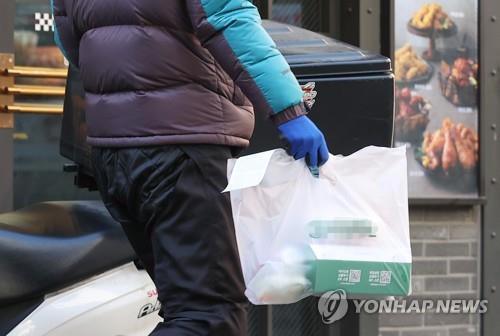 |
| ▲ This undated file shows a man delivering food in Seoul. (Yonhap) |
service industry-2023 tally
S. Korea's service sales growth slows in 2023 as post-pandemic boom eases
By Kim Han-joo
SEJONG, Dec. 19 (Yonhap) -- Sales in South Korea's service industry increased by 2.5 percent on-year in 2023, a slowdown from the robust growth seen in the two previous years on the post-COVID-19 boom, the statistics agency said Thursday.
Sales in the industry came to 3,129 trillion won (US$2.16 trillion) last year, compared with 3,054 trillion won the previous year, according to data compiled by Statistics Korea.
The moderate growth follows strong increases of 10.7 percent and 8.3 percent in 2021 and 2022, respectively, as the country sought to return to pre-pandemic normalcy.
"The pace of growth slowed as the post-pandemic boom eased, coupled with a base effect," said Cho Hye-jin, an official with the agency.
In 2023, the increase in sales was driven by a 13.2 percent on-year surge in the professional, scientific and technical services sector, which reached 28 trillion won, the data showed.
Accommodation and restaurant businesses also saw an 8.9 percent on-year increase in sales, totaling 17 trillion won, as they continued to recover toward pre-pandemic levels.
The total number of businesses in the service industry also went up 2.2 percent on-year to 4.16 million, and their number of employees gained 2 percent to 14.31 million people in 2023.
Sales per company inched up 0.2 percent on-year to 752 million won, and the per-worker sales went up 0.5 percent to 219 million won, the data showed.
Wholesale and retail businesses accounted for 37.9 percent of overall sales in the service industry, followed by restaurants and accommodations with 20.7 percent.
In 2023, 20.9 percent of all businesses in the sector used online platforms, such as mobile apps, to attract customers, up 1.7 percentage points from a year earlier.
Around 42 percent of the businesses offered delivery services in 2023, unchanged from the previous year, according to the data.
The proportion of businesses using self-service kiosks increased by 0.4 percentage point to 6 percent last year.
The agency said the gradual growth highlights the businesses' efforts to reduce dependence on human labor amid rising labor costs.
(END)
(C) Yonhap News Agency. All Rights Reserved

































